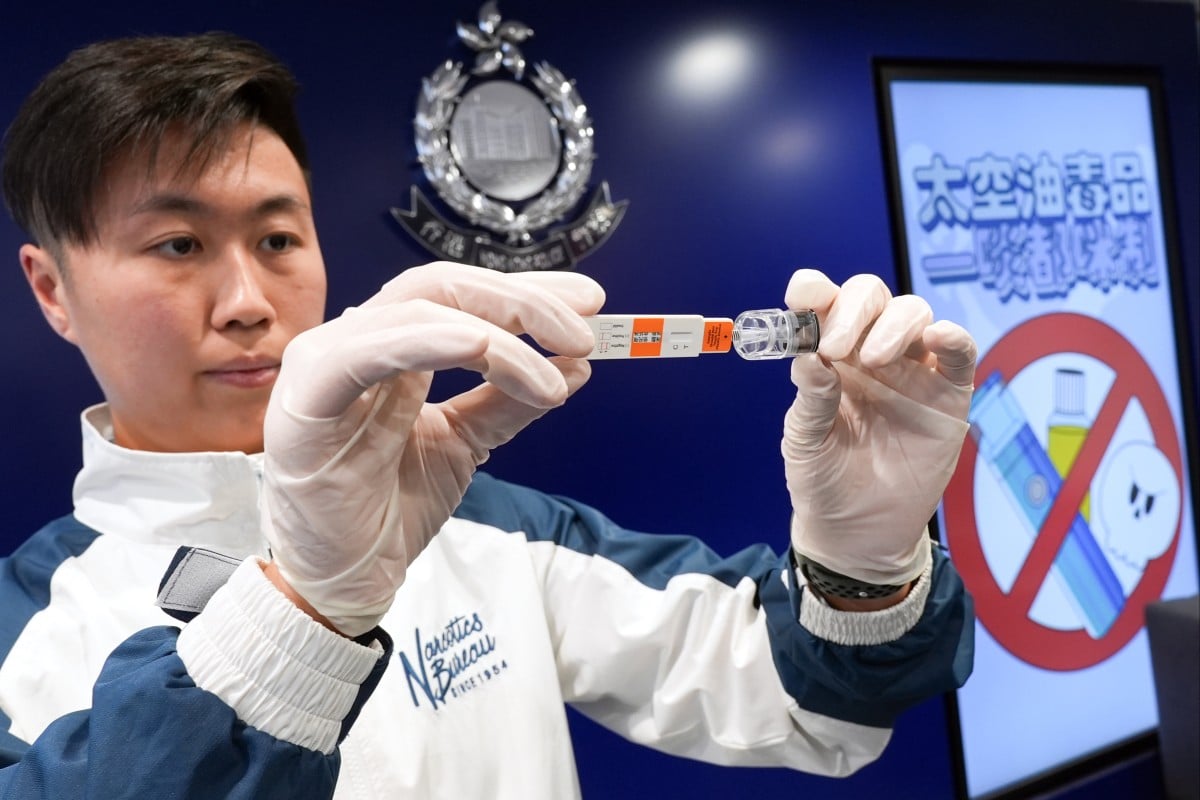
Your Voice: Drug education and job market success (short letters)
This week, students discuss tackling drug misuse without relying on scare tactics and how schools can better prepare them for the job market.
 An officer from the Hong Kong Police’s Narcotics Bureau demonstrates the “space oil” rapid test at Police Headquarters in Wan Chai. Photo: Eugene Lee
An officer from the Hong Kong Police’s Narcotics Bureau demonstrates the “space oil” rapid test at Police Headquarters in Wan Chai. Photo: Eugene LeeHave something to say? Send us a letter using this form.
Action, not fear
Alton Yip Lok-yin, Ma On Shan Tsung Tsin Secondary School
The Hong Kong government plans to officially prohibit the new narcotic substance “space oil”. But the ineffectiveness of similar bans raises concerns about our approach to drug use.
Simply criminalising drugs is insufficient. Legal repercussions do not address the root causes of drug use. Enforcement relies on fear, not prevention.
Many young people using “space oil” were deceived about its dangerous effects, highlighting a critical lack of drug education. Some even turn to drugs as a way to relieve their stress because Hong Kong is a work-focused city that does not prioritise leisure time.
Drugs offer a seemingly easy escape, a message often reinforced by media.
Instead of solely focusing on arrests, the government should prioritise informing individuals about the harmful effects of drugs. They should also focus on supporting youth mental health, providing free counselling services and raising awareness.
While a direct approach to drug control has its place, understanding the reasons people use is essential for a long-term solution. Instead of simply banning each new drug, we must address the causes and support vulnerable individuals.
Your Voice: Urgent need for emotional education, making genuine connections (long letters)
AI pros and cons
Kwan Lok-yin, Tak Nga Secondary School
Artificial intelligence (AI) is increasingly used in education and does offer several advantages.
It can be used to assess students’ strengths and weaknesses in real time, tailor learning experiences and provide immediate feedback. This personalised approach helps students quickly understand and correct mistakes, making studying more efficient.
AI can access many resources like articles, videos and educational websites. It can cater to diverse learning needs and boost student motivation and engagement.
But there are downsides. Over-reliance on AI can discourage traditional study methods like reading textbooks and making notes, preventing deeper comprehension of material.
AI-generated information is also unreliable, potentially leading to confusion and misunderstanding. Dependence on AI for tasks like maths calculations will weaken critical thinking and problem-solving skills.
In short, AI offers personalised learning and easy access to information. However, the risk of over-reliance and misinformation must be considered. Careful and balanced usage is crucial to maximise its benefits.
Job market success
Selina Wan, Pope Paul VI College
Many students leave higher education without the skills needed for job market success. Employers today seek candidates with practical, real-world skills.
However, many academic programmes prioritise theory, leaving students unprepared for their chosen fields. This affects individual careers and hinders economic growth as businesses struggle to find qualified employees.
Internships and hands-on training are often limited and inaccessible to many students. Institutions should prioritise partnering with industries to provide experiential learning for all, ensuring graduates attain knowledge and the relevant experience.
We must also foster continuous learning and adaptability. As industries evolve, so must our approach to education. Collaboration between educational institutions and businesses can bridge the gap, giving students industry insights and allowing employers to influence curriculum.
By aligning academic programmes with workforce needs, we can empower future generations for success and economic contribution.
Your Voice: Elevate your mood and preserve Hong Kong culture (short letters)
Diverse perspectives
Marcus Yip, King Ling College
Teenagers should be encouraged to explore the world, especially via overseas work experiences. These opportunities greatly benefit individuals and society.
Working abroad fosters invaluable personal growth. Navigating a new environment and potentially unfamiliar language will improve communication skills.
Stepping outside one’s comfort zone aids personal development and teaches adaptability.
Returning individuals also come back with diverse perspectives, inspiring cultural exchange and understanding that can lead to a more tolerant, inclusive society willing to tackle serious issues.
These experiences may also inspire community service and advocacy.
Hong Kong graduates boast strong academic backgrounds and are well-suited for many roles in the city and abroad. For example, forensic pathology technicians – who determine the cause and manner of death – require a strong educational foundation for a specialised career path.
I urge teenagers to be forward-thinking and adventurous. Overseas experiences offer mutual benefits, and I hope more young people will embrace the opportunity to discover our vast world and its diverse cultures.
